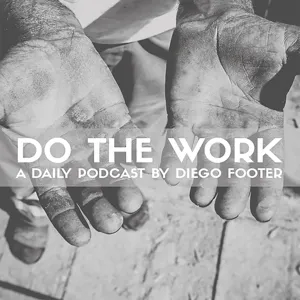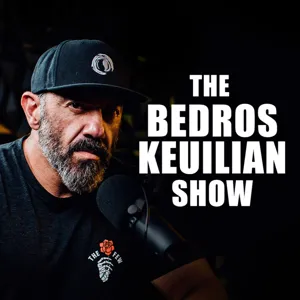Podcast Summary
Thoreau's Insights on Work: Thoreau emphasized the importance of meaningful work, resignation, maintaining vitality through hands-on labor, and avoiding bad faith work.
Thoreau did various types of work, from carpentry to surveying, and even helped raise Emerson's kids. He also pondered the nature of work, particularly the kind necessary for sustaining daily life. Thoreau's insights on work include the value of resignation, the importance of continuing to work with your hands to maintain vitality, what makes for meaningful work, and the trap of working in bad faith. The conversation encourages listeners to consider what they're truly being paid for in their jobs and the true cost of the things they buy. Thoreau's life at Walden Pond, where he lived deliberately, was not just a vacation, but a sustained effort to build his own house, grow his own food, and write some of the greatest pieces of American literature.
Thoreau's Early Work Experiences and Philosophy Towards Economics: Thoreau believed real-world experiences were more valuable than academic learning, emphasizing the importance of creating a livable world through work.
Thoreau, known primarily as a writer, also worked various jobs before gaining fame, including teaching, running a country school, surveying, and serving as a nanny for Emerson's children. His childhood was marked by manual labor and simple living. Thoreau's disdain for high society and academic learning stemmed from his belief that real-world experiences were more valuable. His philosophy towards work was closely linked to his philosophy towards economics, which he saw as the practice of making the world more livable and creating a home. Thoreau's focus on economics was home-based, drawing from the original Greek meaning of the word, oikos, which means to dwell or dwelling. In Walden, Thoreau's chapter on economy emphasizes the importance of understanding work in the context of creating a livable world. Despite his criticism of modern consumerism, Thoreau's work encourages us to consider the role of work in making our homes and the world a better place.
Living Deliberately: Thoreau's Self-Reliance: Thoreau's self-reliance philosophy emphasizes trusting oneself, living modestly, doing enriching work, and examining personal values to lead a more authentic life.
Thoreau's philosophy of self-reliance, as encouraged by Emerson, involves trusting oneself and living modestly to sustain everyday life. Thoreau's diary in "Economy" illustrates this by detailing his simple needs for food, shelter, and clothing. Thoreau's work ethic emphasizes doing enriching and life-affirming work, even if it means quitting jobs that don't align with one's morals or passions. Thoreau's resignation from jobs and emphasis on living deliberately can resonate with contemporary audiences facing economic crises and questioning the alignment of their work and personal values. Thoreau's message encourages self-examination and potential resignation from jobs that don't fit one's ideals, ultimately leading to a more meaningful and authentic life.
Rediscovering Meaningful Labor: Thoreau's resignations were not failures, but opportunities for self-reflection and pursuing meaningful labor. Embrace new experiences and let go of sunk costs.
Thoreau's resignation from jobs or projects that no longer aligned with his values, such as after the death of his brother or the accidental burning down of a forest, were not signs of failure but rather redemptive moves. Thoreau encouraged the practice of challenging oneself with difficult tasks and not being held back by the fallacy of sunk costs. Emerson's critique that Thoreau lacked ambition may have missed the mark, as Thoreau's seeming "loafing" was actually a deliberate pursuit of meaningful labor and self-reliance. Overall, Thoreau's life and work serve as a reminder to be self-reflective, let go of what no longer serves us, and embrace the possibilities of new experiences.
Emerson and Thoreau's Different Approaches to Transcendentalism: Thoreau emphasized the importance of manual labor and practical skills to integrate intellectual pursuits with personal experience, while Emerson remained a public intellectual delivering lectures and making money.
Emerson and Thoreau, despite their close friendship, had different approaches to transcendentalism. Emerson became a public intellectual, delivering lectures and making significant money, while Thoreau continued to write and think, but also prioritized manual labor and practical skills. Thoreau believed in the importance of working with one's hands to counteract modern alienation and reclaim a sense of control over production. He saw this as a way to integrate intellectual pursuits with personal experience. Emerson, on the other hand, appreciated the down-to-earth self-reliance of Thoreau but didn't follow through with it in his own life due to his busy lecture schedule. Thoreau's philosophy of combining intellectual work with manual labor can be seen as a response to the alienation of the workforce in industrial society, an attempt to reconnect with the products of one's labor and regain a sense of ownership.
Working with your hands connects us to nature and provides spiritual vigor: Engaging in manual labor can lead to a profound sense of connection and vitality, offering immediate feedback and intimacy with the natural world.
According to Thoreau and as supported by Matthew Crawford in "Shopcraft," working with your hands provides immediate feedback, spiritual vigor, and a connection to the natural world that intellectual labor may not offer. Thoreau, in his book "Walden," expressed this idea through his experience with growing beans and shaping his environment. Crawford echoed this sentiment in his work, emphasizing the satisfaction and intimacy gained from manual labor. Although manual labor can be drudgery if forced, choosing to use your hands to shape the world and let it shape you in return can lead to a profound sense of connection and vitality. After experiencing a cardiac arrest, one professor of philosophy reflected on the importance of work and vitality, leading him to start a garden and spend more time using his hands. This hands-on approach to life has become a meaningful and sustained practice for him.
Thoreau's Philosophy on Meaningful Work: Seek work that aligns with personal strengths and passions, not just for financial necessity. Meaningful work is freely chosen, personally fulfilling, and has a clear objective.
That according to Henry David Thoreau, meaningful work is essential for a fulfilling life. Meaningful work is freely chosen, has a clear objective, and is personal and unique to the individual. Thoreau believed that work done in "bad faith," where one feels trapped or unable to leave a job, is not truly meaningful. He encouraged individuals to seek out work that aligns with their personal strengths and passions, rather than settling for a job solely based on financial necessity. Thoreau's philosophy emphasizes the importance of living deliberately and being true to oneself, rather than being shackled by societal expectations or financial constraints.
Shift focus from self-interest to world around us: Observing world carefully reveals wonder and meaning, transforming ordinary moments into meaningful experiences
Changing our perspective can help transform seemingly mundane or burdensome tasks into meaningful experiences. Thoreau encourages us to shift our focus from our own self-interest to the needs of others and the world around us. Ella Lyman Cabot's story of appreciating cherries illustrates how carefully observing the world can reveal its wonder and meaning. By staying awake to the world and looking at things from a new perspective, we can find significance in the most ordinary moments of our lives, including our work and caregiving responsibilities. This ability to transform the ordinary into the extraordinary is a valuable skill in adulthood, as life can be monotonous and challenging at times.
Considering the cost of life in work: Thoreau urged us to evaluate the worth of our work based on both monetary gain and the time and life we invest, as the true cost lies in the impact on our overall well-being and future opportunities.
Thoreau's curiosity kept him engaged with the world around him, allowing him to find wonder in the ordinary. He believed that our employer compensates us not just in monetary terms, but also for the time and life we give to our work. Therefore, it's crucial to consider if the monetary gain is worth the time and opportunities we may be sacrificing. Thoreau's famous quote, "The cost of a thing is the amount of what I call life, which is required to be exchanged for it immediately or in the long run," emphasizes the importance of considering the long-term costs of our choices.
Considering the true cost of work: Reflect on the time, energy, and values sacrificed in maintaining or working towards something, and find meaning in the task through acknowledging its goodness.
According to Thoreau, the true cost of a thing goes beyond just the initial price tag or salary. It's essential to consider the time, energy, and potentially sacrificed values in maintaining or working towards that thing. Thoreau's philosophy encourages us to reflect on our work and ask if we would be content with it if it were our last day on earth. In a Therouvian sense, good work is not dependent on divine permission but rather our willingness and ability to acknowledge and embrace the task as good. Confessing to the goodness of our work allows us to find meaning and satisfaction in even the less desirable tasks, making them ours.
Reconsidering our approach to work and non-working moments: Kagg encourages us to view each moment as a personal decision, approach it with good faith, and apply these ideas to our own lives to improve our work experience and overall well-being.
Kagg emphasizes that each moment of work is a personal decision and should be approached with good faith. The book, releasing on June 13th via Princeton University Press, aims to help people reconsider their approach to work and even non-working moments. For more information and resources related to this topic, visit AOM.IS/HenryatWork. Remember, the key is to apply these ideas to your own life and not just listen to podcasts. To enjoy ad-free episodes of the AOIM Podcast, consider signing up for a free month trial of Stitcher Premium using the code MANLESS. Don't forget to leave a review, share the show with others, and keep supporting the continued production of the AOIM Podcast.













